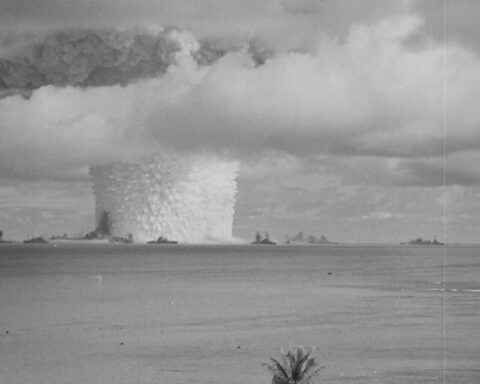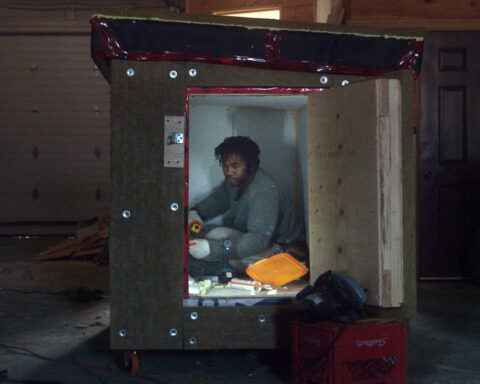“The single most important thing for all of us is to get a better understanding of the real world. And what better way to define what a documentary is about? As you understand the real world about you, the possibilities for loving one another are all the greater.” – Albert Maysles
Errol Morris is known to many as a documentary filmmaker; but I find that description rather limiting. He’s also an alchemist, a philosopher, a synergist, and a sleuth. Snooping out singular subjects, he puts together idiosyncratic moral fables that stimulate lofty existential discourse. With each successive film, Morris gets closer to the core question that motivates his work: Who am I?
Whenever I hear someone say that a particular event changed her life, I’m both skeptical and envious. I’d never had such a turning point. Then one winter’s night in early 1998, I saw Fast, Cheap and Out of Control (1997) and in Morris’s inspired translucence, I saw myself. He affirmed the direction I was going as an aspiring filmmaker: telling heart-felt human stories that connect and uplift.
Flash forward: The 28th Annual Toronto International Film Festival is in high gear and Errol Morris is in town promoting his new film, The Fog of War, about Robert S. McNamara, Secretary of Defense during the Kennedy and Johnson administrations. It’s a beautiful fall day as I amble over to the Hotel Inter-Continental equipped with my day-glo pink 3x5s, psyched for my big meeting with Morris. In the elevator I accidentally step on his foot. Then we’re in the hotel restaurant, toasting each other with freshly squeezed orange juice. We’re just into my second question when he gets pulled away by the CBC. I try to remain calm amidst the celebrity hubbub all around me, knowing I can always follow up by phone.
While waiting for Morris to return, I think of something Jean-Luc Godard once said, “Art is not a reflection of reality. It is the reality of that reflection.” Through the camera lens, Morris holds up all sorts of mirrors, some glitzy and garish, others chipped and old-fashioned. Whether it’s getting to know one of the most controversial figures of the 20th century or an inventor who makes “friendly” execution devices, a lion tamer’s POV or that of a turkey hunter, insights into the infinitely complex human condition bubble forth. For the viewer, the discovery is one of self-recognition.
Errol Morris was born in 1948 on Long Island, New York. As a college student, he studied philosophy, history, and philosophy of science. At one time, he was going to write a thesis on criminal responsibility and the insanity plea, and started doing audio interviews with people who’d been found not guilty by reason of insanity. These were some the seeds of his life-long fascination with the stories we fabricate about “how to pose as ourselves.”
He started making films in the late ’70s and shares a famous, cult film fact with Werner Herzog, his then teacher at Berkeley. Morris had read an article in the San Francisco Chronicle entitled “450 Dead Pets Going to Napa Valley,” was intrigued, and wanted to make a documentary on pet cemeteries. Herzog was skeptical and said, “You make that film and I’ll eat my shoe.” And he did, sautéed in garlic! Les Blank made a short film on it, aptly titled, Werner Herzog Eats His Shoe (1980). Roger Ebert declared Morris’s pet cemetery doc, Gates of Heaven (1978), one of the best films ever made.
Morris reads a lot, which has directly influenced his style and subject choices. The Thin Blue Line (1988) came out a newspaper article, as did Mr. Death: The Rise and Fall of Fred A. Leuchter, Jr. (1999). Stephen Hawking’s book A Brief History of Time was the catalyst for the film of the same name, and The Fog of War shares a similar genesis. When he read McNamara’s In Retrospect, Morris didn’t agree with the media’s general critique of it as a mea culpa; instead, he saw the book as a “thinly disguised autobiography.” Intensely subjective, often problematic, material can provoke in him a response so strong that a film is born.
In the ’80s, Morris’s interest in the psychology of criminal behavior led him to become a private eye, and for a time he even referred to himself as a “director-detective.” The Thin Blue Line evolved out of this. It’s a landmark film, which deserves its dubbing, “the first movie mystery to actually solve a murder.” One of the subjects confessed on film that he was the murderer of a Dallas policeman, while another, wrongfully convicted and on death row, was released from prison. A man’s life was saved because of Morris’s inquisitive and nonthreatening style of filmmaking.
At the heart of each story is the interview — what’s revealed and what remains hidden, what’s on the surface and what lies beneath. Alchemy is the ancient art of transforming the raw matter of nature into a valuable essence. Morris creates cinematic gold with the help of his secret ingredient, the “Interrotron.” His wife coined the name because it’s a “mixture of interview, interrogation and terror.” It’s a revolutionary interviewing device where Morris’s face is projected onto the lens creating a direct intimacy between him and his subject, as well as between the subject and the viewer. Concepts about the subjective/objective experience mingle with those of the representation of identity and “the truth.” Cinema vérité purists beware!
Morris refers to his role as a “provocateur” and “unseen interlocutor.” In what he calls “first-person cinema,” he unobtrusively gets his subjects to say the most natural and compelling things. The first words spoken by Albert, an eccentric, Cartesian philosopher in Vernon, Florida (1981), embody Morris’s metaphysical musings: “Reality, you mean this is the real world? I never thought of that.” In A Brief History of Time (1992) renowned physicist Stephen Hawking strives to know the mind of God: “How real is time? Will it ever come to an end? Why do we remember the past and not the future? Not only does God play dice, he sometimes throws them where they cannot be seen.” By contrast, Fred Leuchter’s journey in Mr. Death is one of historical revisionism, obsessive self-delusion, and the inscrutability of personal perception.
Noelle Elia: With a few exceptions, you consistently use the singular “I” voice, the monologue. Can you talk about that choice?
Errol Morris: Maybe I’m perplexed by the notion of “I”…
NE: And how it relates to the “other.” That reminds me of Ray Mendez, the mole rat specialist in Fast, Cheap and Out of Control. I loved how excited he was by the feeling you get when you look into the eyes of life that has no relation to you, looking straight into the “other” — that it’s something to be wondered at. It’s essentially about seeing yourself, whether it’s an animal or another human being.
EM: I’ve also always liked that moment myself, when Ray says, “I am. You are.” It has a lot of metaphorical content in it that applies to my filmmaking in general, which I like. I think every single one of the films has been motivated by a certain level of curiosity. They’re investigations. And as such, I don’t know where they’re heading. You have hunches about certain things, but you may find out things you could never have possibly imagined.
NE: What comes through is this innate curiosity that motivates all of us. When you talk about your films, you’ve used a great phrase, “the mystery of personality,” how it’s the greatest mystery of all. What does that mean to you?
EM: Who we are ourselves, who are the people that we speak with? I’m really fascinated with what people say when asked to give an account of themselves in their own words, and using what they say in so many odd ways that probably do not follow from the interviews themselves. Making connections between things. I probably would not like to call my work over-processed cheese, but there is processing involved.
***
Morris’s unique style is chock-full of layered imagery and rearranged self-disclosure. To achieve this, he relies on lots of visual/conceptual strategies: archival and found footage; re-enactments and super-stylized, symbolic allusions; gritty film resolutions and slick interview techniques. Humor, irony and, ultimately, compassion bleed through; and although his films are highly reconstructed, they also feel logical — like saying, “Yes, of course.” As tableaux vivants, they reflect his personal beliefs and aesthetic sensibility—clearly this is someone who has meditated on the complexities of existence.
When Morris returns from his CBC interview, he settles back into his chair and we begin again. The noise has escalated around us—a baby wails at the next table—so I lean in, trying to restore some intimacy. It can be tricky interviewing someone you really admire, but I feel at ease with him. This is probably his tenth interview of the day, yet he’s polite and gracious, modest even, a far cry from a posturing, Hollywood filmmaker. There are many things I want to ask about his philosophy and the emotional motivation of his work, but he keeps bringing it back to McNamara. It’s a press junket, after all.
The Fog of War is Morris’s first overtly historical film and he’s well aware that it “runs in the face of how history’s normally done. It makes no claim for balance or objectivity.” He structured the film as “Eleven lessons from the life of Robert S. McNamara” with chapter headings such as “Rationality will not save us. There’s something beyond oneself. Be prepared to re-examine your reasoning.” Morris waded through over twenty hours of interview with McNamara, and emerged with an engrossing look at one man’s interpretation of history. He covers World War II and the little-known firebombing of Tokyo in 1945; McNamara’s rise to the head of the Ford Motor Company; the Cuban Missile Crisis; and culminates with the Vietnam War. Spliced between signature-style collages of archival wartime footage and staged visual metaphors, McNamara tries to derive some conclusions about his actions. He posits a revealing question, “What makes us omniscient?” Once again, Morris’s latest film mirrors his attraction to elusive, philosophical conundrums.
NE: You refer to yourself as a “contrarian” with regards to making this film. In what way?
EM: I do believe a different view of McNamara emerges, a much more complex view than the one that people accepted as truth. People who are of my generation all know him; the (Vietnam) war was often written about as “McNamara’s War.” Younger generations have no knowledge of him at all. It’s interesting for me to talk to people who have no opinion about him versus people who have very, very strong opinions about him and how they see the movie. If one of the themes of the movie is that believing is seeing, then for people who have very strong beliefs about him, the movie in many ways may support some of those beliefs, and in many other ways, may not. The question I always liked in David Lynch’s Elephant Man is when Treves asks himself that very question, “Am I a good man or a bad man?”
NE: It’s the ultimate self-reflexive question. And the gray inevitably wins out. What you do, it’s like the Robert McNamara Rubik’s Cube.
EM: It’s a good comparison; he certainly is the Robert McNamara Rubik’s Cube for me. Who is McNamara? Do we like him? Do we hate him? Someone asked about the first lesson (in The Fog of War), “Empathize with your enemy” and whether that applied to my filmmaking as well. The answer is Yes, I do. One of the most troubling things about the politics of our time is seeing things in terms of clear distinctions — good/evil, right/wrong. The truth of the matter is that the world is a gray place, and a very complex place. I set out to make a movie about McNamara in his own words, but I ended up making a movie about right now. It’s quite relevant to the situation we now find ourselves in.
I once pointed out that a good documentary film preserves, in some way, the relationship of the filmmaker with his subjects; that it’s there in some form or another. I worried during the course of making the movie, am I being fair to McNamara on the one hand, and on the other, am I being a shill for him? What is my role here? I think I’ve made some sort of peace with myself because I think that question is somewhere in the movie. I don’t think I’m either for him; (I’m) not an apologist, and I didn’t make a movie trying to prove he’s as bad as people thought he was. I would even argue that the attempt to explore how McNamara sees himself and the world is as interesting, if not more interesting, than an objective, historical account which would be from the outside looking in rather than the other way around. The questions that the movie provoked, and perhaps my main reason for even making it in the first place, remain.
NE: The contradictory, coexisting components?
EM: Yes. When you make a movie about a real person and you have a relationship with that person, you have feelings, inevitably. It’s inevitable, having spent two years, off and on, talking to McNamara that I have strong feelings about him. It’s also quite simply the case that I’ve grown to like him, which complicates things even more. Liking him doesn’t mean I feel any differently about the war in Vietnam, because I don’t. I found it abhorrent in the ’60s and ’70s and I find it abhorrent now, thirty-plus years later. Now that the movie is about to come out and people are starting to write about it, it becomes interesting on a whole other level as well.
***
There’s a poignant moment in the film when McNamara quotes the famous T.S. Eliot line, “We shall not cease from exploration, and the end of our exploring shall be to arrive where we started and know the place for the first time.” Such is the circularity of life and of Morris’s oeuvre.
He has always wanted to make features and dramas; instead he’s ended up making documentary after documentary. Even now, when Morris has promised that he’s not going to make another one, he finds himself being pulled toward stories that have a strong investigative element. What attracts him to his characters is that they’re all passionate, they’re connected to different aspects of the world, and most importantly, they have stories to tell. Lately, his challenge is to figure out how to stop making so many commercials. I point out that they’re not exactly for mom ‘n pop used car lots, but corporate “big boys” like Citibank and Intel. “Ah,” he says with a chuckle, “the seduction of making money.”
I ask Morris about his hopes for his work and his life, and am surprised to discover that he doesn’t have a strong belief in hope. He brings up Max Brod, Kafka’s closest friend: “Brod describes talking to Franz Kafka and asks him, ‘What about hope? Surely you believe in hope.’ And Kafka says, ‘Yes, of course, but not for us.’”
This confuses me because I feel so much hope watching his films. It’s easy to get down about the state of the world, but then there’s Ray Mendez in Fast, Cheap and Out of Control. He’s one of my heroes. Ray’s whole raison d’être is about self-knowledge through emotional connection, that we don’t need to be afraid of the “other,” or of difference. And George Mendonça, the topiary artist in the same film, who’ll spend years and years shaping one animal, “bringing to it a level of commitment, love, and passion that makes the enterprise almost sublime.” What could be more hopeful than that?
He tells me an inspiring story about Rodney (the robot scientist in Fast Cheap) who married again because of the movie. A woman called him up and told him how much she hated the film but how much she liked him in it. They got together, fell in love, and married. I couldn’t help blurting out, “That’s so hot!” Morris laughs, “I now like to think of myself as some sort of perverted matchmaker.”
Fast, Cheap and Out of Control was inspired in part by a Yeats poem called “Lapis Lazuli” that Morris likes very much. Essentially, Yeats says that all things fall and are built again; and those that build them are “gay.” In that poetic reference there’s an intrinsic optimism, to which Morris adds,“There’s the hope of being actually able to create something of beauty, something of interest. Capturing something about oneself and the world.”
A PR gal appears suddenly, telling us very matter-of-factly, “Time’s up.” Morris looks at me, subtle apologies in his eyes. As I walk out of the buzzing hotel into the sunshine, I feel expanded, yet more integrated — Errol Morris is a genuine conduit for positive change, and it’s infectious. A pet cemetery owner in Gates of Heaven sums it up nicely, “As the old timers say, ‘to be a success in this world, find a need and fill it.’” Which makes me wonder why, time and again, his work has been described as “oddball,” “unorthodox,”“weird,” and “askew.” For me, he’s a visionary, and a warm and friendly one at that.
In the end, it’s all about bringing something new into creation. Through the watching of his films, we – the viewer, the filmmaker and his subjects – connect. And it’s from this connection that change is possible: reflection, dialogue, action, and greater acceptance of self, and of others.











